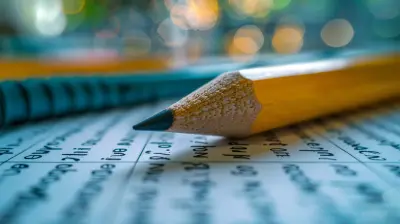7 October 2025
Let’s face it—reading can be a tough mountain to climb for some kids. While others seem to gobble up books like candy, struggling readers often feel stuck on the first page, frustrated and left behind. But here’s the deal: struggling readers aren’t lazy or uninterested—they just need the right strategies and support to unlock their potential.
In this post, we’re diving deep into practical, real-world strategies for supporting struggling readers. Whether you’re a teacher, a parent, or someone who simply cares, there’s something here to help you guide that reluctant reader toward reading success.
Why Do Some Readers Struggle? (And No, It’s Not Because They Don’t Try)
Before we dive into strategies, it helps to know the why. Struggling readers aren’t a one-size-fits-all group. There are a few common culprits behind reading difficulties:- Learning differences like dyslexia
- Lack of foundational skills (phonemic awareness, phonics)
- Limited vocabulary
- Poor decoding or fluency
- Minimal exposure to books and reading at home
- Low confidence or motivation
Think of reading like building a house. If the foundation is shaky, the rest won’t hold up well. And some kids just haven’t had the tools or the time to lay that steady base.
Strategy #1: Start with Phonemic Awareness and Phonics
If kids can’t hear and break down sounds in words, they’ll struggle to read them. That’s where phonemic awareness comes in.What You Can Do:
- Practice segmenting and blending sounds: Say a word like “cat” and ask them to break it into sounds — /c/ /a/ /t/.- Play sound games: Rhyming, “I Spy” with letter sounds, and tongue twisters help build phonemic skills without feeling like a lesson.
- Use systematic phonics programs that introduce letters and sounds in a logical order.
Phonics is like giving kids the secret decoder ring to unlock words. It’s foundational and, when taught explicitly, can work wonders.
Strategy #2: Build Vocabulary Intentionally
Let’s be real—reading is a lot harder when you don’t know what the words mean. Vocabulary gaps can make a fluent reader stumble like someone tripping over invisible hurdles.Try This:
- Pre-teach vocabulary before reading a new book. Introduce tricky words with visuals and examples.- Use word maps: Have kids define the word, draw it, use it in a sentence, and list synonyms.
- Read aloud often: Yes, even for older students. It exposes them to new language structures and vocabulary in context.
Words are the building blocks of comprehension. The more words they know, the better they’ll understand and enjoy what they read.
Strategy #3: Make Reading Interactive and Fun
Reading shouldn't feel like punishment. So, let’s ditch the dry drills and bring in some joy.Engaging Ideas:
- Try reader’s theater: Kids love performing. It’s a sneaky way to work on fluency and expression.- Use graphic novels or comics: These can be a lifeline for struggling readers. They’re less intimidating and deeply engaging.
- Let them choose what to read: Autonomy = motivation. Even if it’s a magazine about video games or a book about slime, go for it.
Reading success is all about confidence. If they enjoy it, they’ll do it more. Simple as that.
Strategy #4: Scaffold Comprehension in Real Time
Ever watch a student read an entire page and then say, “Wait… what did I just read?” That’s where comprehension scaffolds come in.Tools That Help:
- Think-alouds: Model your thinking process while reading. “Hmm, I wonder why the character did that?”- Use graphic organizers like story maps and cause-and-effect charts to break things down visually.
- Ask guiding questions before, during, and after reading. Not just “What happened?” but “Why do you think it happened?” or “What might happen next?”
Don’t assume silence means understanding. We’ve got to peel back the layers and walk with them through the process.
Strategy #5: Provide Frequent, Targeted Feedback
Imagine trying to improve your swing in baseball without a coach saying, “Hey, try turning your wrist like this.” Reading is no different. Constructive feedback helps students adjust and improve.Do This:
- Give specific praise: Instead of “Good job,” say “I like how you slowed down on that tricky word.”- Offer gentle corrections: If they misread a word, let them try again, offer a hint, or ask, “Does that make sense?”
- Use mini-conferences: One-on-one talks where you discuss what they’re doing well and what to work on next.
Feedback isn’t about pointing out flaws. It’s about guiding and cheering them on one step at a time.
Strategy #6: Integrate Technology Thoughtfully
Tech often gets a bad rap, but when used right, it’s like rocket fuel for struggling readers.Recommended Tools:
- Text-to-speech apps: Tools like NaturalReader or Voice Dream Reader can help kids follow along while hearing correct pronunciation and phrasing.- Reading apps with adaptive features: Think Epic!, Raz-Kids, or Read Theory. They adjust to the student’s level and keep them engaged.
- Audiobooks: Pair an audiobook with the physical book. This combo helps bridge the decoding gap while building comprehension.
Let’s not fight technology—let’s put it to work for our readers.
Strategy #7: Build Stamina One Page at a Time
Some kids are sprinters, not marathoners. That’s okay. Reading stamina is built slowly.Here’s How:
- Set mini-goals: "Let’s read for five minutes straight," or, "Let’s finish one chapter today."- Use a timer and track progress. Make it a game.
- Alternate reading styles: Partner reading, echo reading, or listening and following along can break the monotony.
Think of it like exercising a muscle. A little each day builds endurance.
Strategy #8: Encourage a Growth Mindset Around Reading
The way struggling readers see themselves matters. If they believe they’re “bad readers,” it becomes a self-fulfilling prophecy. But if they see progress? Game changer.Mindset Shifts to Promote:
- Praise effort over perfection. “You worked hard on that word!”- Set realistic, short-term goals they can actually meet. Then celebrate.
- Share stories of famous people who struggled with reading. Show them that struggle isn’t the end—it’s part of the journey.
Reading ability isn’t fixed—it’s flexible. And belief plays a big role in unlocking growth.
Strategy #9: Partner with Parents and Caregivers
Support doesn’t stop when the school bell rings. Home can be a huge help—or a hidden hurdle.Ways to Involve Families:
- Send home reading strategies or book lists matched to the child’s level.- Encourage daily read-alouds at home, even 10 minutes a day makes a difference.
- Offer workshops or resources for families so they don’t feel lost.
When school and home work together, struggling readers stand a much better chance.
Strategy #10: Don’t Skip Progress Monitoring
Here’s the thing—if we don’t measure it, we can’t improve it. Struggling readers need regular check-ins to track growth.Use Tools Like:
- Running records- DIBELS or similar fluency checks
- Reading journals or logs
- Informal comprehension quizzes
Keep it low-pressure, but be consistent. Progress may be small and slow—but it’s happening.
Final Thoughts: Every Reader is a Work in Progress
There’s no magic fix or overnight cure, but with patience, consistency, and the right strategies, struggling readers can flourish. They just need some extra tools in their toolbox—and someone who believes in them.And hey, if you’re reading this, you’re probably that person. So keep going. Keep trying. Keep cheering them on.
Every great reader was once a beginner—and every struggling reader has a story that’s far from finished.









Judith McNulty
This article effectively highlights the multifaceted approaches necessary to support struggling readers. Emphasizing individualized instruction, technology integration, and parental involvement fosters a holistic understanding of literacy challenges. By addressing these dimensions, educators can create tailored strategies that not only improve reading skills but also enhance students' overall confidence and engagement with learning.
February 22, 2026 at 12:04 PM